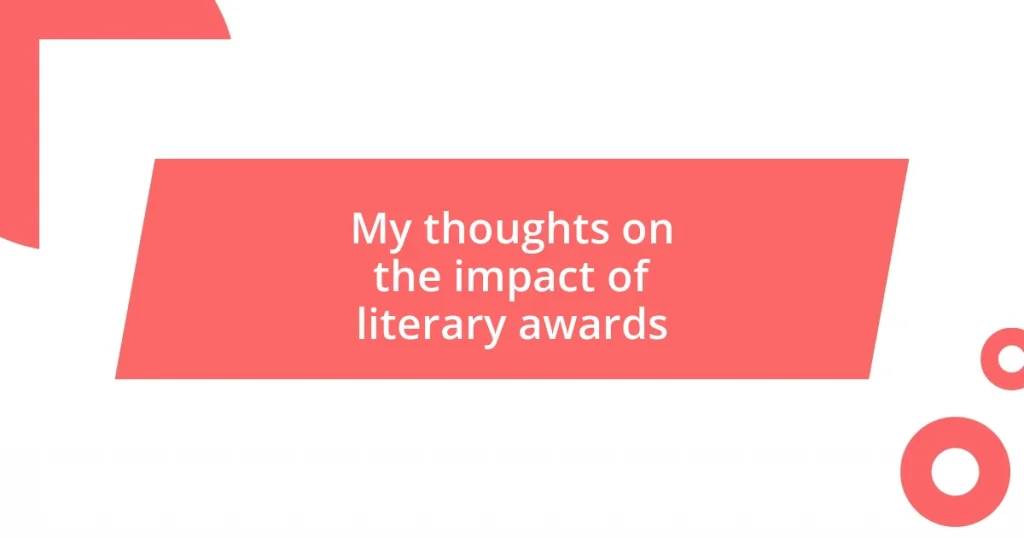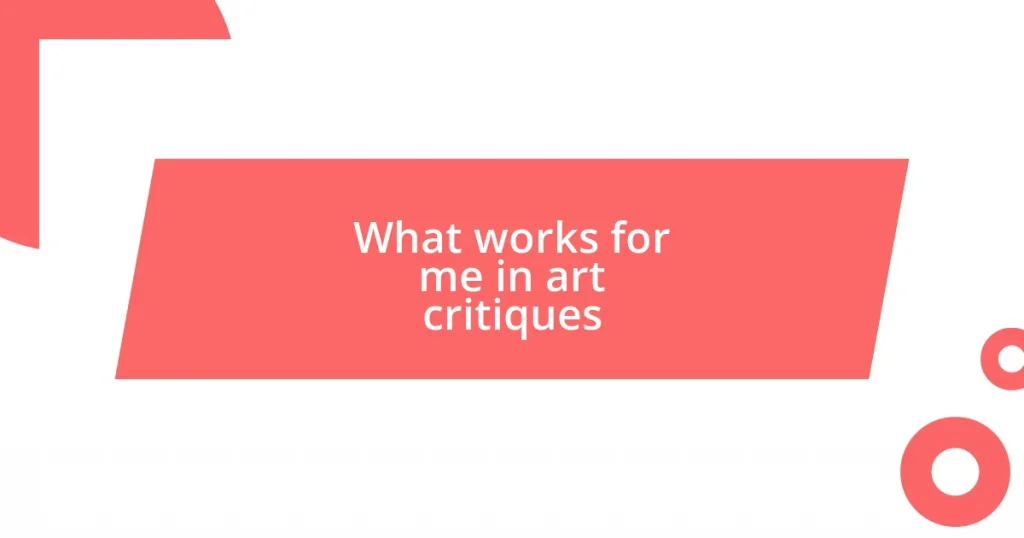Key takeaways:
- Literary awards significantly impact authors by validating their work, boosting sales, and fostering community connections.
- They can stimulate local economies through increased book sales and tourism, creating a ripple effect in the literary ecosystem.
- Future trends indicate a move towards inclusivity and the influence of technology in the award selection process, potentially reshaping perceptions and recognition in literature.
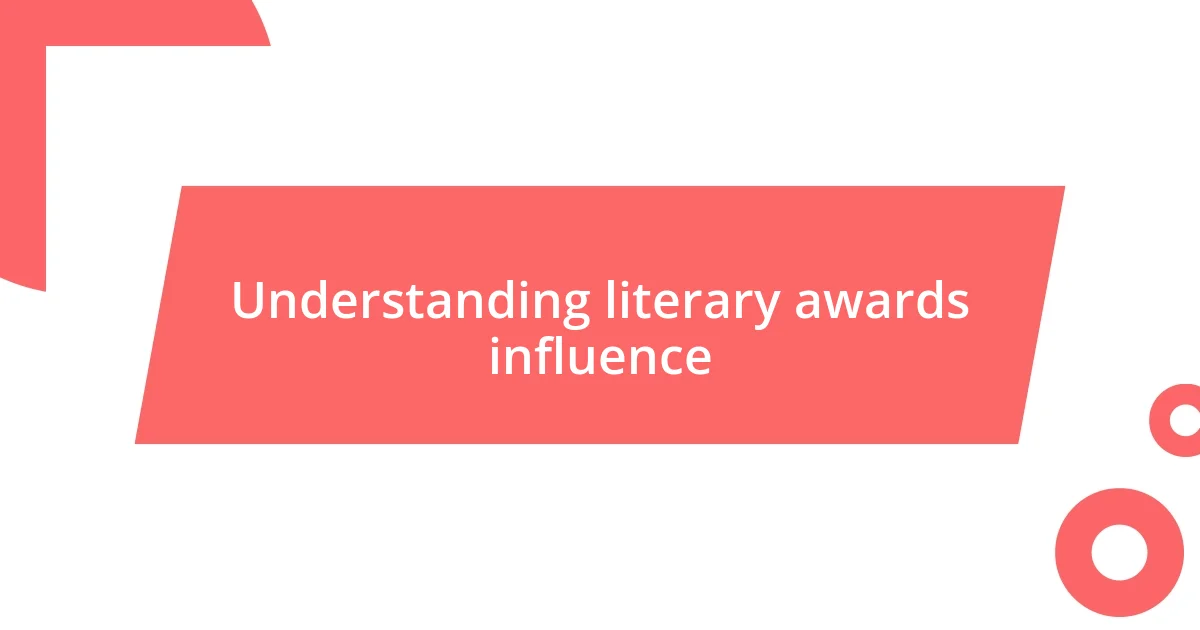
Understanding literary awards influence
Literary awards can drastically alter the trajectory of an author’s career and the visibility of their work. I remember the first time a friend of mine was nominated for a prestigious award; the excitement in her voice was palpable. It made me wonder, could recognition like this inject new life into an author’s passion and creativity?
The influence of literary awards extends beyond individual accolades; they often shape industry trends and reading habits. For instance, the buzz surrounding a winner can lead to an influx of readers exploring genres they might have overlooked. It begs the question, do these accolades push us toward new perspectives, or do they create echo chambers where only the celebrated voices are heard?
I’ve also seen how awards can spark meaningful conversations about diversity and inclusion in literature. When certain titles win, they challenge the status quo and demand acknowledgment of underrepresented narratives. Isn’t it uplifting to think that a single award could shine a light on stories that resonate deeply with many, yet often go unheard?
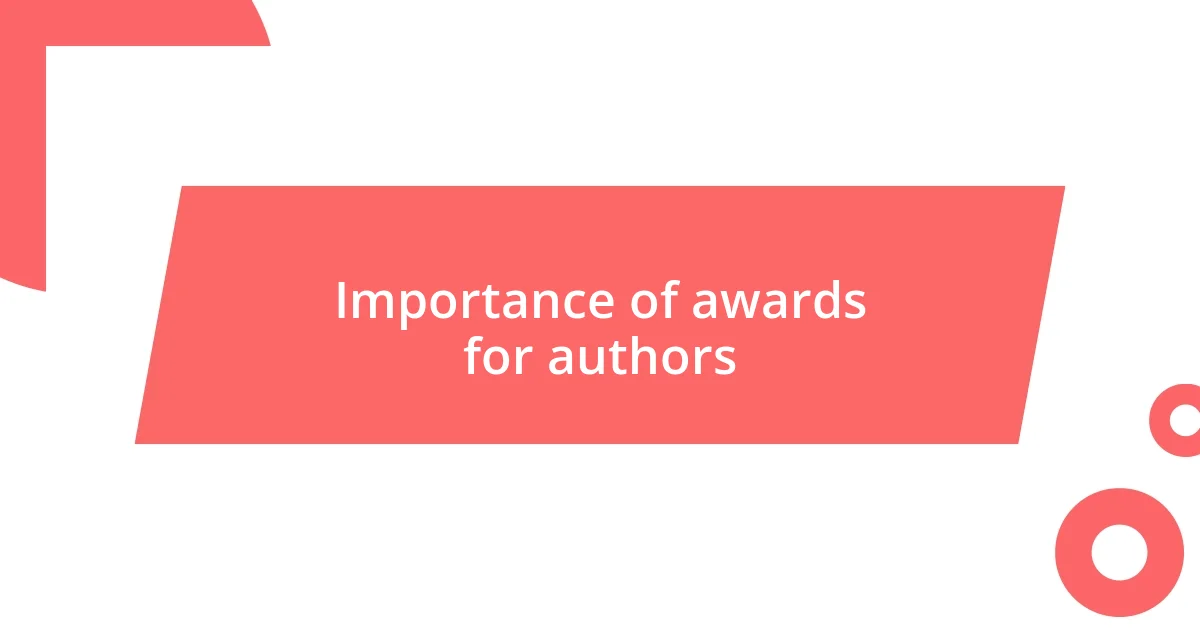
Importance of awards for authors
Literary awards serve as a form of validation for authors, often affirming their hard work and dedication. When I received a small local award for my writing, it felt like I had finally been recognized for the late nights and countless revisions. The boost in confidence was staggering; it ignited a fire to pursue even bolder themes in my next project.
Moreover, these awards often lead to increased sales and visibility. I once had a conversation with an author who won a national prize; she mentioned that after her win, her book’s sales skyrocketed. It’s fascinating how a simple accolade can change the landscape of an author’s career overnight and open up doors to opportunities that were previously unavailable.
In addition, literary awards can create a sense of community among writers. When I attended an awards ceremony and mingled with other nominees, I felt a warmth and camaraderie that validated our shared journeys. It’s incredible how these moments not only celebrate individual achievements but also foster connections that can lead to collaborative projects and lifelong friendships.
| Benefit of Awards | Impact on Authors |
|---|---|
| Validation | Increases confidence and motivation. |
| Visibility | Boosts sales and opens opportunities. |
| Community | Fosters connections and collaborations. |
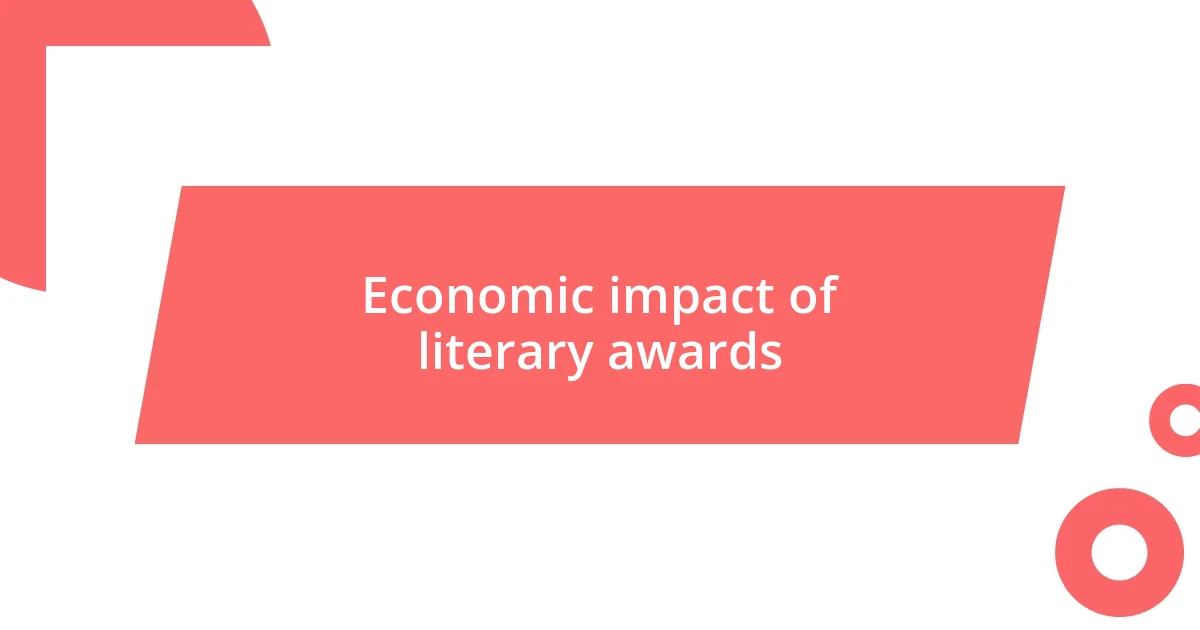
Economic impact of literary awards
When I think about the economic impact of literary awards, I can’t help but recall the conversations I’ve had with booksellers who often share their experiences. Winning a prestigious award can lead to a surge in book sales, with some titles flying off the shelves, resulting in increased revenue for independent bookstores. This not only benefits authors but also creates a ripple effect in the local economy, from printing companies to distributors and even the cafes where readers gather to discuss their newly discovered favorites.
Here are some key points to consider:
- Sales Boost: Award-winning books often see dramatic sales increases, benefiting both authors and retailers.
- Publishing Opportunities: Recognition can lead to new publishing contracts and translations, opening doors to international markets.
- Economic Stimulation: Increased book sales can stimulate local economies, benefiting associated businesses like cafes and bookstores.
I’ve also noticed how literary awards can elevate the profile of a region or a literary community. For instance, when a local author wins an award, there’s often an uptick in tourism and interest in that area, as curious readers flock to discover more about the winner’s background and influences. The excitement can be contagious; I remember attending events where the buzz surrounding a winner seemed to spark increased interest in the local literary scene. It’s fascinating how these accolades can create a mini-economy fueled by literature that brings people together in imaginative ways.

Awards as a marketing tool
Literary awards can be powerful marketing tools for authors, acting as a stamp of approval that attracts new readers. I recall a time when I stumbled upon an award-winning novel in my local bookstore purely because the label caught my eye. It made me wonder—how many others have discovered hidden gems simply because they were recognized with accolades? This boost in visibility can dramatically shift a book’s trajectory.
When an author wins an award, it’s not just about the trophy; it’s about creating buzz. I’ve seen firsthand how a simple mention of an award on social media can generate excitement. After winning an award myself, I noticed a flurry of engagement from readers and fellow writers alike. They want to know what makes that book special and why it earned such recognition. It’s a conversation starter that can propel both sales and a loyal readership.
Additionally, awards often lead to enhanced promotional opportunities, such as interviews and speaking engagements. I remember attending a panel where several award-winning authors shared their journeys. Their stories resonated with the audience, and I could feel the excitement building in the room. Those conversations and features became invaluable publicity that further elevated their work, proving once again that recognition can create a multiplying effect far beyond the initial thrill of victory.
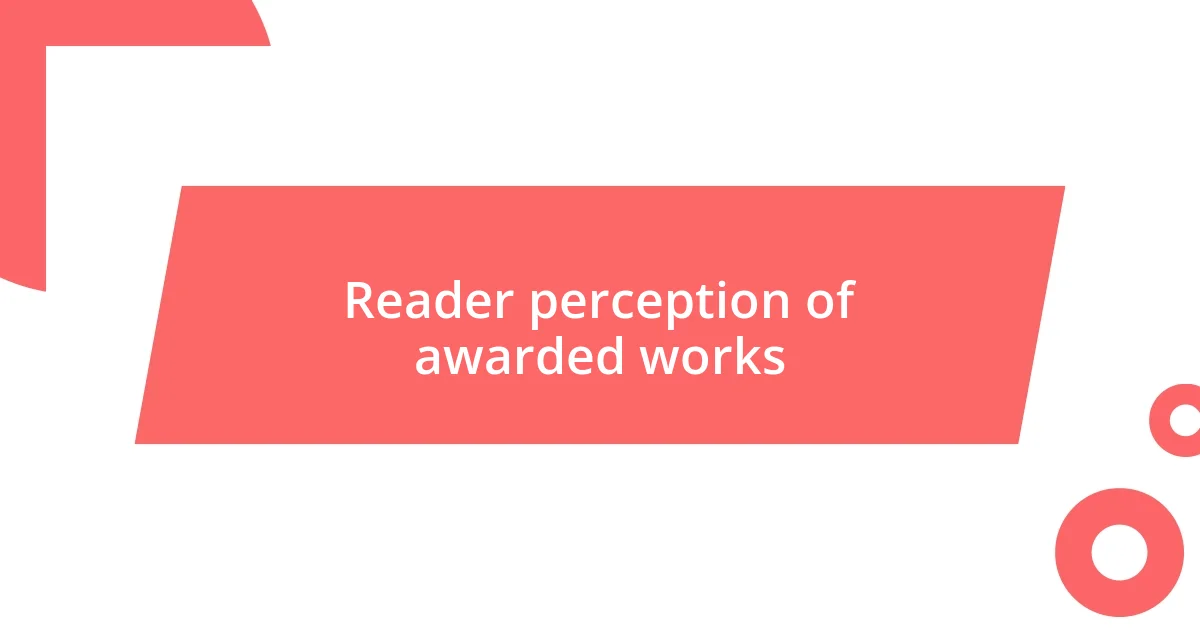
Reader perception of awarded works
Reader perception of awarded works varies greatly, and it often hinges on the trust established between the reader and the awarding body. I vividly recall my own hesitation when diving into an award-winning book; I questioned if the praise was truly warranted or simply a marketing tactic. When I finally picked up one such novel, I was pleasantly surprised. It was as though the award had set my expectations, crafting an excitement that wouldn’t let me put the book down.
There’s also an interesting psychological aspect to it. When readers see a book adorned with multiple awards, it can create an immediate sense of credibility. I remember attending a book club where we excitedly discussed titles that had won various accolades. It felt like we were in on a secret—discovering beloved stories that millions recognized. This shared experience allowed us to bond over our interpretations and favorites, deepening our reading journey. Have you ever felt that buzz when discussing an award-winning book with friends? Those moments can transform our perception and appreciation of the literature.
Ultimately, the influence of literary awards often shapes our reading choices, even if we don’t realize it. I’ve noticed that my own book list has shifted dramatically after seeing a title celebrated with accolades. There’s a unique thrill in exploring what makes these works worthy of attention. It’s almost like embarking on a treasure hunt, where each discovery leads to new insights and inspiration. What about you? How do you feel when you pick up a book that has received critical acclaim?
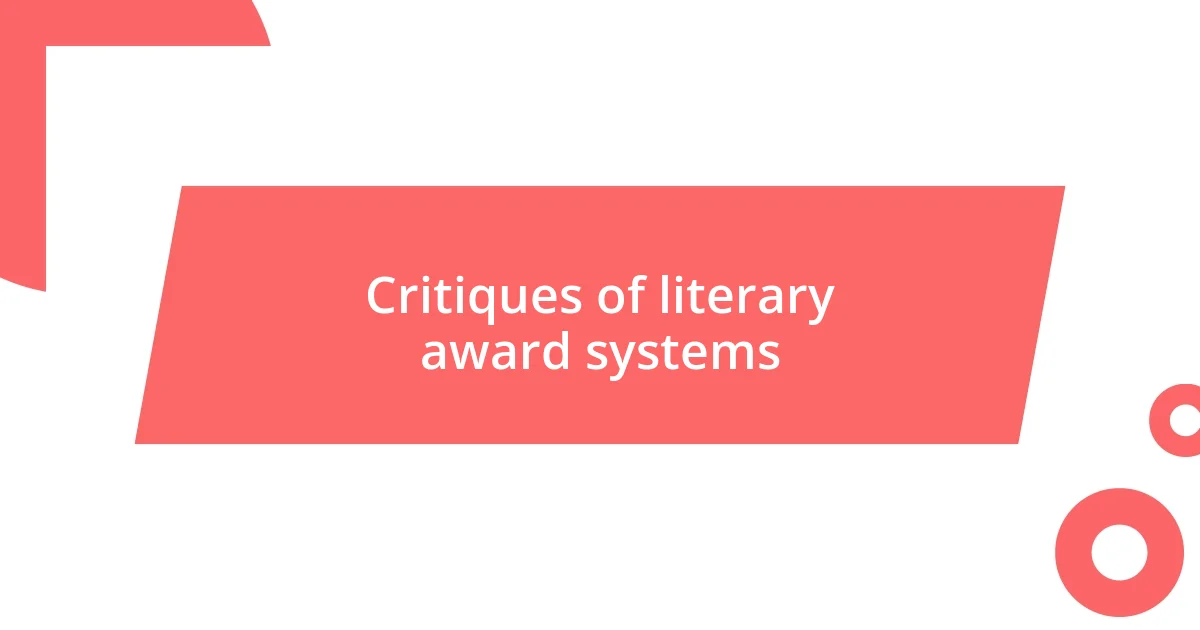
Critiques of literary award systems
Critiques of literary award systems often focus on the notion of bias and subjectivity. I’ve found myself questioning the criteria used for judging, especially when certain genres or voices are consistently overlooked. For instance, when my favorite sci-fi author didn’t receive an award nomination, I couldn’t help but wonder if the panel even considered the emotional depth and creativity that defined their work. Does that mean awards favor the mainstream over the innovative?
Another critique revolves around the impact on diversity in literature. I can recall attending a literary event where this topic sparked a passionate debate. As I listened to diverse voices share their experiences, it became clear that many incredibly talented writers struggle for recognition. It’s disheartening to think that the very systems designed to elevate literature might inadvertently stifle the unique narratives that don’t fit a certain mold. How many brilliant stories are left untold simply because they don’t align with conventional criteria?
Lastly, the emphasis on awards can lead to a narrow definition of success in the literary world. Reflecting on my own journey, I’ve seen how many authors become disheartened when their works don’t receive accolades. I remember a fellow writer sharing their feelings of inadequacy after watching a less deserving book win a prestigious award. This sense of disappointment can dissuade creativity, creating an atmosphere where authors feel pressured to conform to the tastes of a select few rather than exploring their own unique voices. Isn’t it vital that we celebrate creativity over conformity?
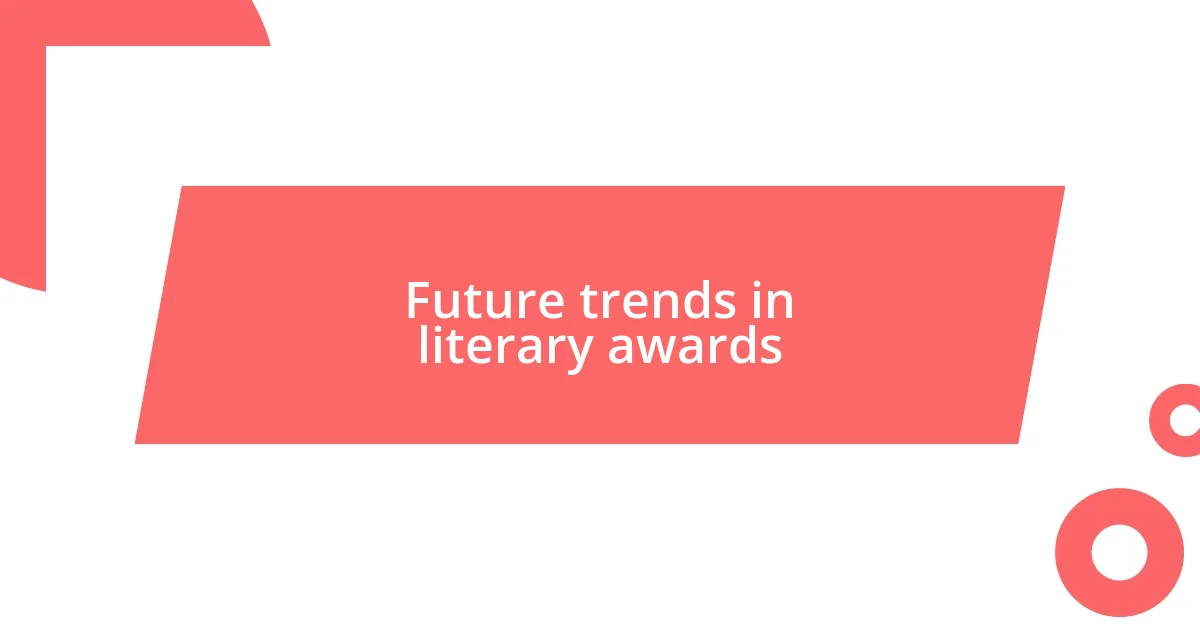
Future trends in literary awards
There’s a palpable shift toward inclusivity in literary awards, reflecting a broader societal push for diversity. I recently came across an award that specifically celebrated underrepresented voices, and I felt a rush of hope. It’s refreshing to see recognition extended to those who have historically been sidelined. Could this be a turning point for literature?
Additionally, the rise of digital platforms is changing how awards are perceived. I often find myself engaging with online communities that share their favorites and advocate for deserving but lesser-known authors. This grassroots enthusiasm can influence the traditional awards landscape significantly. Are we witnessing a democratization of literary acclaim?
Moreover, technology is playing a fascinating role in shaping the future of literary awards. With algorithms analyzing book trends, there’s potential for more data-driven decisions in nominations. I wonder how this might streamline the process, but it also raises concerns about the loss of human touch. Will the soul of literary merit be compromised in favor of statistics? The evolution of these awards will certainly be a space to watch closely, as it could redefine recognition in meaningful ways.










